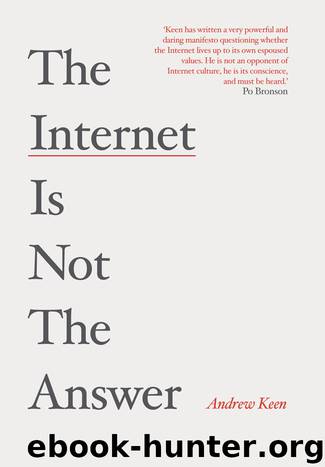The Internet is Not the Answer by Andrew Keen

Author:Andrew Keen
Language: eng
Format: epub
Publisher: Atlantic Books Ltd
CHAPTER SIX
THE ONE PERCENT ECONOMY
An Abundance of Stupidity
My own epiphany about the Internet’s disastrous impact on culture is well documented. In the fall of 2005, I was invited to a weekend event called FOO Camp. FOO, as I mentioned earlier, is an acronym for “Friends of O’Reilly” and it refers to that same Tim “How I Failed” O’Reilly who owned and operated the profitable Web 2.0 meme and is now, according to his modest Twitter profile, “helping the future unfold.” FOO Camp is O’Reilly Media’s annual slumber party in which the media mogul invites a couple of hundred illustrious geeks—Silicon Valley’s antiestablishment establishment—to spend a weekend on the idyllic grounds of his Sonoma, California, wine country headquarters to celebrate how the Internet is radically disrupting the world.
Just as Michael Birch presented the Battery as an unclub, FOO Camp described itself as an “unconference conference”—the ideal event, of course, for the Web’s unestablishment. In practice, this meant that the camp was an entirely unstructured event whose monotonously repetitive agenda was set by its self-aggrandizing participants. Like the Internet itself, the only FOO Camp rule was that there were no rules. Anyone could give talks about anything they liked. And, mirroring the Internet’s own echo chamber culture, this resulted in a cacophonous uniformity of opinion.
The real abundance at FOO Camp were of the words media and democracy. Phrases like “media democracy,” “the democratization of media,” and “democratic media” were chanted ad nauseam by the young white male FOO Campers. The speeches—or the “conversation,” to use the digitally correct term—were all variations upon a single theme. What can help us create a better world in the digital age? everyone at FOO Camp asked. The Internet was the answer, they all agreed, because it “democratized” media, giving a voice to everyone, thereby making it more diverse. By “disintermediating” traditional media, FOO Campers all agreed, Web 2.0 companies like YouTube, Flickr, Blogger, and Wikipedia circumvented what they pejoratively called “the gatekeepers”—those guys like Larry Kay, my old boss at Fi, who had historically controlled the printing presses, recording studios, and movie studios.
What was particularly annoying about FOO Camp was how all the powerful, wealthy campers—from Silicon Valley investors to entrepreneurs to technologists—assumed that their self-interest in transforming the Web into a platform for user-generated content automatically squared with the general interest of everybody else in the world. Like most revolutionaries, they had appointed themselves as the emancipators of the people, without bothering to check with the people first. There was no real conversation at FOO Camp. Irrespective of the question, the Internet was always the answer.
FOO Camp was my wake-up call to the absurdity and hypocrisy of the Silicon Valley unestablishment. It triggered my 2007 book, The Cult of the Amateur: How Today’s Internet Is Killing Our Culture, in which I argued that this supposed “democratization” of media had benefited a small minority of technology insiders rather than the majority of people. A thriving twentieth-century music, video, and publishing economy, I argued, was being replaced
Download
This site does not store any files on its server. We only index and link to content provided by other sites. Please contact the content providers to delete copyright contents if any and email us, we'll remove relevant links or contents immediately.
Bad Blood by John Carreyrou(6608)
Rich Dad Poor Dad by Robert T. Kiyosaki(6596)
Principles: Life and Work by Ray Dalio(6403)
Playing to Win_ How Strategy Really Works by A.G. Lafley & Roger L. Martin(6207)
Management Strategies for the Cloud Revolution: How Cloud Computing Is Transforming Business and Why You Can't Afford to Be Left Behind by Charles Babcock(4562)
The Confidence Code by Katty Kay(4245)
Thinking in Bets by Annie Duke(4213)
American Kingpin by Nick Bilton(3869)
Delivering Happiness by Tony Hsieh(3415)
Project Animal Farm: An Accidental Journey into the Secret World of Farming and the Truth About Our Food by Sonia Faruqi(3211)
The Power of Habit by Charles Duhigg(3121)
The Tyranny of Metrics by Jerry Z. Muller(3056)
Brotopia by Emily Chang(3047)
The Marketing Plan Handbook: Develop Big-Picture Marketing Plans for Pennies on the Dollar by Robert W. Bly(3041)
Mastering Bitcoin: Programming the Open Blockchain by Andreas M. Antonopoulos(3033)
I Live in the Future & Here's How It Works by Nick Bilton(2984)
The Content Trap by Bharat Anand(2913)
Building a StoryBrand by Donald Miller(2889)
Applied Empathy by Michael Ventura(2888)
